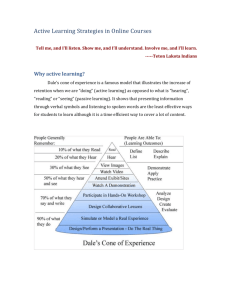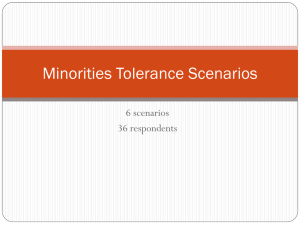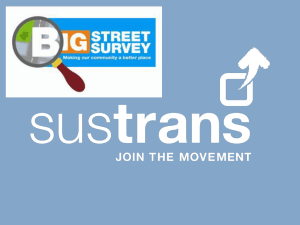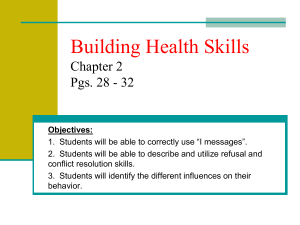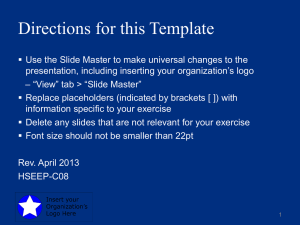EDUCATION STRATEGY REVIEW: Responses from Open Sessions
advertisement
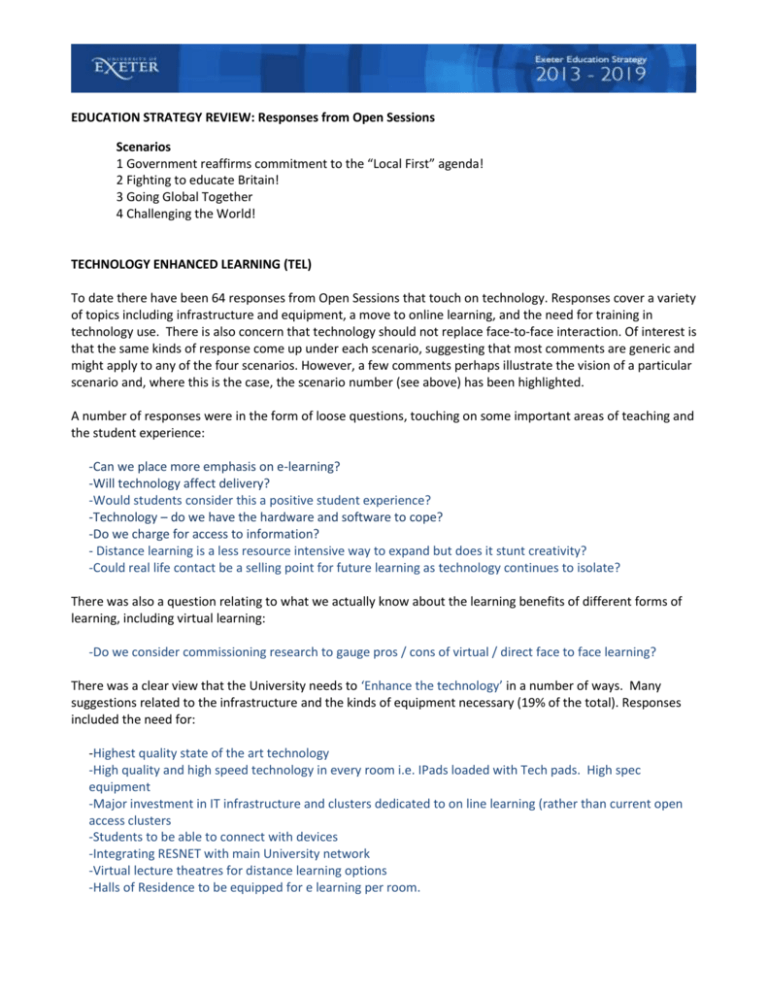
EDUCATION STRATEGY REVIEW: Responses from Open Sessions Scenarios 1 Government reaffirms commitment to the “Local First” agenda! 2 Fighting to educate Britain! 3 Going Global Together 4 Challenging the World! TECHNOLOGY ENHANCED LEARNING (TEL) To date there have been 64 responses from Open Sessions that touch on technology. Responses cover a variety of topics including infrastructure and equipment, a move to online learning, and the need for training in technology use. There is also concern that technology should not replace face-to-face interaction. Of interest is that the same kinds of response come up under each scenario, suggesting that most comments are generic and might apply to any of the four scenarios. However, a few comments perhaps illustrate the vision of a particular scenario and, where this is the case, the scenario number (see above) has been highlighted. A number of responses were in the form of loose questions, touching on some important areas of teaching and the student experience: -Can we place more emphasis on e-learning? -Will technology affect delivery? -Would students consider this a positive student experience? -Technology – do we have the hardware and software to cope? -Do we charge for access to information? - Distance learning is a less resource intensive way to expand but does it stunt creativity? -Could real life contact be a selling point for future learning as technology continues to isolate? There was also a question relating to what we actually know about the learning benefits of different forms of learning, including virtual learning: -Do we consider commissioning research to gauge pros / cons of virtual / direct face to face learning? There was a clear view that the University needs to ‘Enhance the technology’ in a number of ways. Many suggestions related to the infrastructure and the kinds of equipment necessary (19% of the total). Responses included the need for: -Highest quality state of the art technology -High quality and high speed technology in every room i.e. IPads loaded with Tech pads. High spec equipment -Major investment in IT infrastructure and clusters dedicated to on line learning (rather than current open access clusters -Students to be able to connect with devices -Integrating RESNET with main University network -Virtual lecture theatres for distance learning options -Halls of Residence to be equipped for e learning per room. There was a warning that: ‘University systems are currently behind many cloud based experiences’, and there are requests for more attention to laptops: -More provision for students and staff to use their own laptops and tablets -Lease laptops to students at a low cost -Investment in power and network for people to use their own laptops / tablets, especially wifi as many devices don't have ethernet sockets. Finally, there was a vision of ‘Halls – students learn in bed – IPTV to review coursework etc’ (scenario 3). Seventeen per cent of comments focused on examples of what learning and teaching activities technology should be used for. One aspect raised was assessment: -Time, support and innovative solutions to assessment and feedback i.e. computer marked exams -Investment in stable technology to support assessments -Better technology and e-assessment. A number of comments related in some way to lectures or lecturing and many, implicitly, to the enhancement of online activity with students, with lectures being available beyond the lecture theatre. -Research -interactive lectures and activities -“Interactive Echo” - allowing people to post questions / comments as they watch the recording. -Lectures can be given electronically and lecturers should try to engage students more -Podcasts by “famous” professors -Virtual lectures via Skype -Using digital for student lectures -Improve ECHO / video conferencing across all campuses -Improve video conference compatibility with other systems e.g. Skype, Adobe Connect) Increased staff availability through digital media, emphasis on problem solving (flipping the classroom). Overall, by far the largest number of comments, over a third, related specifically to online learning. -Learning experience should be based on high quality on line / technology based. -Definite need to develop virtual student experience -Expectation that should be on line includes: books, articles, coursework, ECHO 360. Full reading lists on line with links and no costs -On line resources – in chunks -Digital course lending -Students offered the opportunity for distance learning as well as campus based experience. Online learning was associated with accessibility of learning and an ‘any time’, ‘anywhere’ approach: - Expansion of ways of learning - 24/7 on line learning - need to develop infrastructure to support this - Expect to access what they want when they want -People can choose when they want to learn as all materials will be on line. -More travel and teaching at different hours and through digital means There were also some highly innovative, ‘big’ ideas that related to specific scenarios. -Niche markets? Shared provision of teaching amongst Russell Group universities e.g. a year in Exeter, one one in Bristol, one in Cardiff ,etc or teaching options from different academics at different universities depending on syllabus – on line? (scenario 2) -Technology emphasis – we feel that Exeter could offer something distinctive… TECHNOLOGY PLUS (Scenario 3) - Work with the Russell Group universities to produce an E campus (scenario 2) - There is no classroom, all delivered on line (MOOC a-go -go) (scenario 4) Fourteen percent of comments overall highlighted a need for support and training if we are to use more technology successfully. -Maybe more training for teaching staff with more attention paid to effective knowledge transfer -Staff would need to be more IT literate and would inevitably need more support regarding e learning and on line resources -More resources required on areas such as e learning. -Have excellent technical skills. -Digital literacy – learning in many formats - IT specialists to support increased demand -Expectation of I.T. services with education / teaching staff – quality time -“Buy in” from academics who don’t want to adopt new ways of teaching, eg College administrators book ECHO recordings for lecturers but the academic staff often refuse to be recorded and will stop or sabotage a scheduled recording. Thirteen percent of responses, though not negative towards technology-enhanced learning per se, warned that there are potential pitfalls. These include: supporting passive learning through TEL, or making use of inappropriate online resources or equipment. Full immersion in study and culture rather than passive, virtual engagement. Need careful vetting as not all on line resources are reliable High spec equipment but must be relevant On line resources - Need to be careful we don’t reduce our investment in this area The importance of face-to-face interaction is also highlighted. The more interactive side of learning should be face to face. BUT must be linked to an increase in current levels of smart group, face to face learning opportunities. Mismatch between technological capabilities and the way people learn (face to face and contact hours)
